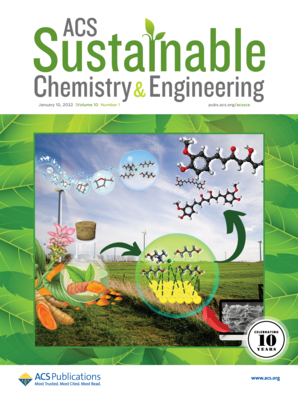通过合作催化和 C-N/C-C/C-H 三重活化实现酰胺的机械化学脱羰基交叉偶联
IF 7.1
1区 化学
Q1 CHEMISTRY, MULTIDISCIPLINARY
引用次数: 0
摘要
在可持续条件下形成碳-碳和碳-杂原子键方面,无溶剂机械化学交联反应已成为一个强大的前沿领域。然而,尽管取得了长足的进步,机械化学脱羰基交叉偶联反应却一直未被探索。在此,我们首次报道了通过 C-N/C-C/C-H 三重活化实现酰胺杂芳基化的脱羰基机械化学交联。该催化体系利用镍/铜协同催化,同时激活酰胺的 N-C(O)键和杂环的 C-H 键,从而实现了高化学选择性偶联。该反应的特点是酰胺和杂环成分的范围很广,可以生成杂环,而杂环是有机合成中最重要的支架之一。我们证明,脱羰基机械化学交联反应将为获得一系列有价值的产品提供新的途径,这些产品是有机化学中最常见的结构之一。本文章由计算机程序翻译,如有差异,请以英文原文为准。

Mechanochemical Decarbonylative Cross-Coupling of Amides via Cooperative Catalysis and Triple C–N/C–C/C–H Activation
Mechanochemical solvent-less cross-couplings have emerged as a powerful frontier in the formation of carbon–carbon and carbon–heteroatom bonds under sustainable conditions. However, despite considerable progress, mechanochemical decarbonylative cross-couplings have been unexplored. Herein, we report the first decarbonylative mechanochemical cross-coupling for the heteroarylation of amides by a triple C–N/C–C/C–H activation. The catalytic system exploits cooperative Ni/Cu catalysis to simultaneously activate the amide N–C(O) and the heterocycle C–H bonds, resulting in a highly chemoselective coupling. The reaction is characterized by a broad scope of the amide and the heterocyclic component to furnish heterobiaryls, which are among the most privileged scaffolds in organic synthesis. We demonstrate that decarbonylative mechanochemical cross-couplings will provide novel access to a range of valuable products that are among the most common structures in organic chemistry.
求助全文
通过发布文献求助,成功后即可免费获取论文全文。
去求助
来源期刊

ACS Sustainable Chemistry & Engineering
CHEMISTRY, MULTIDISCIPLINARY-ENGINEERING, CHEMICAL
CiteScore
13.80
自引率
4.80%
发文量
1470
审稿时长
1.7 months
期刊介绍:
ACS Sustainable Chemistry & Engineering is a prestigious weekly peer-reviewed scientific journal published by the American Chemical Society. Dedicated to advancing the principles of green chemistry and green engineering, it covers a wide array of research topics including green chemistry, green engineering, biomass, alternative energy, and life cycle assessment.
The journal welcomes submissions in various formats, including Letters, Articles, Features, and Perspectives (Reviews), that address the challenges of sustainability in the chemical enterprise and contribute to the advancement of sustainable practices. Join us in shaping the future of sustainable chemistry and engineering.
 求助内容:
求助内容: 应助结果提醒方式:
应助结果提醒方式:


